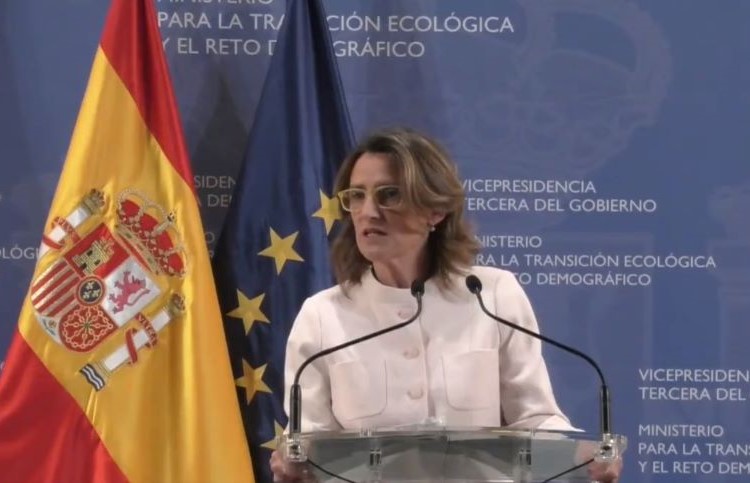The Diplomat
The third vice-president of the Government and Minister for Ecological Transition, Teresa Ribera, announced yesterday her rejection of the Gas Demand Reduction Plan presented yesterday by the European Commission because “Spain has done its homework, spending more than other countries, to ensure security of supply” and, “unlike other countries”, has not lived “above its possibilities from the energy point of view”.
The Commission yesterday proposed a new legislative instrument and a European Gas Demand Reduction Plan that aims to reduce consumption by 15% by next spring. “The European Union risks facing further cuts in gas supplies from Russia, given that the Kremlin is using its gas exports as a weapon and almost half of our Member States have already been affected by the reduction in supply,” the Commission said in a statement. Therefore, “taking action now can reduce both the risk and the costs to Europe in the event of additional or full disruptions, strengthening European energy resilience,” it added.
With this Plan, the Commission urges “all consumers, public administrations, households, owners of public buildings, electricity suppliers and industry” to “take action to save gas” and commits to accelerate “work on diversification of supply, including joint gas procurement, in order to strengthen the EU’s ability to obtain alternative gas supplies”.
To this end, Brussels proposes a new Council Regulation on coordinated measures for gas demand reduction that “would set a target for all Member States: to reduce gas demand by 15% between 1 August 2022 and 31 March 2023”. The new Regulation would also give the Commission the possibility to declare, after consulting Member States, a “Union alert” on security of supply, and impose a mandatory gas demand reduction on all Member States. “Member States must update their national emergency plans by the end of September to show how they intend to achieve the reduction target, and report to the Commission every two months on progress made,” the Commission added.
To help Member States achieve the necessary demand reductions, the Commission has also adopted a European Gas Demand Reduction Plan that sets out measures, principles and criteria for a coordinated reduction in demand. The Plan focuses on the substitution of gas by other fuels and on overall energy savings in all sectors. It aims to safeguard supplies to households and essential users, such as hospitals, but also to industries that are critical to the supply of products and services essential to the economy, as well as to the EU’s supply chains and competitiveness. The Plan provides guidelines for Member States to take into account when planning the reduction.
Spain’s rejection
After the publication of the Brussels proposal, Teresa Ribera stated in a press conference that the Government is opposed to “the imposition of obligations that are above what is required of other partners”, since, she assured, “Spain has done its homework, spending more than other countries, to ensure security of supply” and our country “is the gateway for more than 30% of liquefied natural gas (LNG) in Europe”.
For this reason, she announced, the Executive of Pedro Sánchez will come “with its own proposal to the Council of Energy Ministers” next week. The Government’s objective, she specified, is that Spain’s gas consumption reduction requirements be reduced from 15% to 10%, taking into account Spain’s capacity to re-export gas to Europe. “Whatever happens, Spanish families will not suffer gas or electricity cuts in their homes. Whatever happens, Spain is going to defend the position of Spanish industry,” she declared.
“We want to help, but not to have solutions imposed on us that are neither adjusted nor effective for what is intended,” she continued. “Spain has been asking for two decades for interconnection obligations to be met, either through the ordinary measures or the extraordinary ones that are being invoked today, and despite this there has been inaction from the EU. This is why we are almost an energy island, which limits our capacity to help”, she recalled.
In Ribera’s opinion, “a disproportionate sacrifice” cannot be asked of Spain because “the situation of each country is different, the result of efforts paid by domestic and industrial consumers”. “Our storage capacity is at 80% and that of the rest of Europe at 50% thanks to the investments made in the last 25 years, we have more than a third of the regasification and storage capacity of Europe, we have already implemented a winter plan and we have achieved a position that allows us to say that the Commission’s proposal is not the most effective, nor the fairest,” she asserted. “Homogeneously reducing gas demand without taking into consideration the energy mix, which is the responsibility of each State, is not necessarily a neutral proposal,” she warned.
“They cannot demand from us a sacrifice on which we have not been asked for an opinion”, because, “unlike other countries, we have not lived beyond our means from the energy point of view”, declared Teresa Ribera, paraphrasing the accusations of which Spain was the object by the countries of Northern Europe after the financial crisis of 2008. “We will not allow proposals that make us suffer over other partners,” she said.







